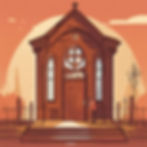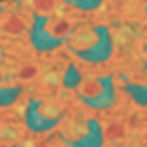
"I go to church because I know that I will be surrounded by people who are fundamentally different from me and that it will take courage to show up and stay" (Brown, 2017, p. 121). As I read Brene's quote, my body turns inward to protect a wound so deep that it left my soul in fragments after such a traumatic experience of serving a little country church.
"The major problems in the world are the result of the difference between how nature works and the way people think" (Bateson, 1972, p. 46).
Culture can, will, and does shape our thoughts, experiences, and behavior. It can shape it so much that when a difference enters our world, we can be immediately activated to fight, flight, or fawn. "We say that we 'recognize' a difference, and we 'recognize' a change; but the meaning of these words implies that we already know what we are looking at" (Bateson, 1979, p. 29). Differences can be perceived positively, with ambiguity, or provoke a fear before we have examined and/or know "what we are looking at." If we are unable to sit with the tension of anything that is different from us, we are in danger of harming another human being.
Brene says, "We have sorted ourselves into factions based on our politics and ideology. We’ve turned away from one another and toward blame and rage" (Brown, 2017, p. 46). What a shame. It weighs so heavily on my soul that humans are so afraid of other humans who are different.
When Brene says she goes to church because she will be surrounded by people who are fundamentally different from her, I turn inward because the church is what wounded my soul, stole my agency, and nearly ruined my family. Church, like any other system, has the potential to be fear-based. Fear is the recognition of difference. For people like me who grew up with relational trauma and are yearning for secure attachment, church can be damaging. Hang with me and allow me to explain.
"The fear of difference is a fear of the unknown, a fear that is deeply embedded in the human psyche" (Bateson, 1972, p. 497).
I don't know how often I was cautioned to "be in the world but not of it." It reinforced my sympathetic nervous system to continue in survival mode and prejudice. The world is different; it is not "like us." Danger around every corner. My body understood. Church reinforced my learned experiences of the world: to be guarded because "the devil prowls around like a lion ready to devour." When we walk through life looking around every corner for a lion, we will indeed find it. Not only are we sure to find the lions, but we are biologically and physiologically training our brains and body to continue walking the same paths of fear with our parasympathetic nervous system activated.
If a person walks into a church, "broken and looking for a hospital," with relational trauma from insecure attachments and hears the mantras that are familiar to their lived experiences, they can like me, become trauma bonded to the church. The church will feed the familiar fears, teach us what to do and what not to do, and come alongside us. We have a new tribe of unhealed, traumatized people using the magic of scripture to make us better and save us from "the hell we deserve." Traumatized people are trading one toxic system for the same system that looks a little different. "It is a pattern of patterns" (Bateson, 1979).

"Trauma results in a fundamental reorganization of the way mind and brain manage perceptions. It changes not only how we think and what we think about, but also our very capacity to think. We become stuck in the same paths" (van der Kolk, 2014, p. 21).
"When you are in survival mode, the part of your brain that responds to the threat thinks you are being chased by a tiger, even if the danger is not immediate or real" (Levine, 2010, p. 28). The church teaches us that we are being chased by lions, tigers, and bears (oh my!). Let's turn our rational brains online and understand the fallacy of this.
Just because a person is Christian does not (always mean) the person of faith is in danger of lions, tigers, or bears. However, I have often seen people of faith put themselves in dangerous-to-them situations because fear of difference provokes their prejudice, belief system, or worldview. Then, when the people of faith receive pushback from people who are different, their fear is provoked further--lions, tigers, and bears. OH MY! Rather than the people of faith sitting in the tension and pushing past the fear that comes because their belief system is being challenged--they cry wolf. They become the "victim." If victims do not heal, they often become the abusers, but this is another topic for another day.
"Prejudice is a categorical predisposition to behave in a certain way toward people based on their membership in a particular group" (Parrillo, 2019, p. 72). "Be in the world but not of it," is the prejudiced slogan of the Christian church based on the predisposition of their faith to behave in a certain way toward people who are different from them based on their membership to their faith.
My husband was fired from that small church I mentioned earlier because we were "too different." We were fired due to prejudice based on a predisposition to behave in a certain way toward people based on the membership of their church. We mostly looked the same, mostly thought the same, and practiced our faith in the same denomination, but because we did things differently, they couldn't control us or the environment that was changing- FIRED. They percieved a difference and they were not willing to bend or flow with the difference. The difference provoked fear, which caused anger, control, and hatred of us. The difference was a "them" problem, but we paid the price because of prejudice provoked by a fear of difference.
Brene says, "We are more likely to engage in polarizing behaviors when we are socially and emotionally isolated from people who are different from us" (Brown, 2017, p. 69).
That little country church and their refusal to step outside their social context to intentionally engage with others who are different from them, including the rejection of us (they would not participate with any of the community church leaders or organizations on a regular and personal level) and the judgmental sermons on the more prominent churches in town with their teenagers drinking, having pre-marital sex, and pregnancies outside of marriage--has led to their polarization and isolation from anyone different than them.
It broke us.
However, I am thankful for the brokenness and healing that has come. I see how their polarizations have hurt us and our community at large. I no longer hold onto the pain. Rather, I have challenged myself, as I heal, to be around those who are completely different from me. I refuse ever to damage another human being so deeply based on prejudice, a fear of difference, or my personal worldview. Because of this, I will love more profoundly than I have ever loved. I will be the holder and keeper of space for those who are the polar opposite of me and lean into the tension that stretches me so that I expand greatly. May we all be agency givers and sit in places that challenge us to practice what we preach.
Brown, B. (2017). Braving the Wilderness: The quest for true belonging and the courage to stand alone. Random House.
Bateson, G. (1972). Steps to an ecology of mind. Chandler Publishing Company.
Bateson, G. (1979). Mind and nature: A necessary unity. Bantam Books.
Levine, P. A. (2010). In an unspoken voice: How the body releases trauma and restores goodness. North Atlantic Books.
van der Kolk, B. (2014). The body keeps the score: Brain, mind, and body in the healing of trauma. Viking.
4o


